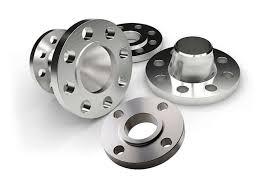Super Duplex Steel Flanges: Strength, Reliability, and Corrosion Resistance

In industries where materials are pushed to their limits—such as offshore drilling, chemical processing, and power generation—the need for reliable components is crucial. One such component is the Super Duplex Steel Flange. Known for its superior mechanical strength and outstanding corrosion resistance, Super Duplex steel has become a trusted choice for engineers and project managers across various demanding applications.
In this blog, we’ll explore what makes Super Duplex Steel Flanges stand out, their benefits, common applications, and key considerations when selecting the right flange for your operations.
What is Super Duplex Steel?
Super Duplex steel is a type of stainless steel that contains a balanced mix of austenitic and ferritic microstructures. This dual-phase structure provides a unique combination of high strength and excellent corrosion resistance—especially in chloride-rich environments where traditional stainless steels like 304 and 316 may fail.
Common grades of Super Duplex steel include:
-
UNS S32750 (F53)
-
UNS S32760 (F55)
These grades are alloyed with high levels of chromium (24–26%), molybdenum (3–4%), and nitrogen, offering superior performance under aggressive conditions.
What Are Super Duplex Steel Flanges?
A flange is a component used to connect pipes, valves, pumps, and other equipment. Super Duplex Steel Flanges are flanges manufactured from super duplex grades and are designed to withstand extreme environments—particularly those involving high pressure, temperature, or corrosive chemicals.
Types of Super Duplex Steel Flanges:
-
Weld Neck Flange (WN)
-
Slip-On Flange (SO)
-
Blind Flange (BL)
-
Socket Weld Flange (SW)
-
Lap Joint Flange (LJ)
-
Threaded Flange (TH)
Each type serves a specific purpose and is chosen based on the mechanical requirements and installation preferences.
Advantages of Super Duplex Steel Flanges
✅ Exceptional Mechanical Strength
Super Duplex steel offers twice the strength of conventional austenitic stainless steels, enabling reduced wall thickness in piping systems. This strength leads to cost savings in both material and handling.
✅ Outstanding Corrosion Resistance
Super Duplex flanges provide excellent resistance to:
-
Pitting
-
Crevice corrosion
-
Chloride stress corrosion cracking (SCC)
This makes them highly effective in marine, offshore, and chemical environments.
✅ High Thermal Conductivity & Low Thermal Expansion
The thermal properties of Super Duplex steel make it stable under varying temperatures and minimize the risk of distortion during operation.
✅ Extended Service Life
Due to their strength and corrosion resistance, these flanges require less frequent maintenance and replacement, resulting in lower total lifecycle costs.
✅ Cost Efficiency Over Time
While Super Duplex Steel Flanges might carry a higher upfront cost compared to standard flanges, the long-term savings from reduced failures and longer service life make them a smart investment.
Applications of Super Duplex Steel Flanges
Because of their durability, Super Duplex Steel Flanges are used in industries that demand high reliability under extreme conditions. Common applications include:
🔹 Oil & Gas Industry
-
Subsea pipelines
-
Offshore platforms
-
Pressure vessels
-
FPSOs (Floating Production Storage and Offloading)
🔹 Chemical Processing Plants
-
Acidic and high-temperature environments
-
Chloride-bearing chemical transfer lines
🔹 Marine and Shipbuilding
-
Seawater piping systems
-
Desalination plants
-
Heat exchangers
🔹 Power Generation
-
High-pressure steam systems
-
Cooling water systems in nuclear plants
🔹 Pulp and Paper Industry
-
Bleaching plants
-
Digesters exposed to aggressive chemicals
Standards and Specifications
To ensure global quality and performance, Super Duplex Steel Flanges are manufactured in compliance with international standards such as:
-
ASTM A182 F53 / F55
-
ASME B16.5 / B16.47
-
EN 1092-1
-
DIN Standards
-
NACE MR0175 / ISO 15156 (for sour service)
These certifications assure buyers that the flange will meet specific performance, dimensional, and safety requirements.
Selecting the Right Super Duplex Flange
Here are a few factors to consider when choosing Super Duplex Steel Flanges:
-
Operating Pressure and Temperature: Ensure the flange can withstand your system’s pressure and thermal cycles.
-
Corrosion Environment: Consider chloride concentration, pH, and chemical exposure.
-
Size and Thickness Requirements: Match the flange specifications to your piping dimensions and project needs.
-
Flange Type: Choose the appropriate flange design based on installation methods and sealing requirements.
-
Certifications & Testing: Look for flanges that are third-party tested for tensile strength, hardness, PMI, and impact resistance.
Super Duplex Steel vs. Other Flange Materials
| Material | Strength | Corrosion Resistance | Cost | Best Use Case |
|---|---|---|---|---|
| 304 Stainless Steel | Moderate | Moderate | Low | General piping |
| 316 Stainless Steel | High | Good (for chlorides) | Moderate | Food, pharma |
| Duplex Steel | Very High | Excellent | High | Oil, marine |
| Super Duplex | Superior | Excellent++ | Higher | Extreme service |
Final Thoughts
Super Duplex Steel Flanges offer unmatched performance when it comes to handling high pressure, corrosive substances, and harsh environments. Their dual-phase microstructure ensures exceptional mechanical strength, while their chemical composition offers long-term corrosion resistance
- Art
- Causes
- Crafts
- Dance
- Drinks
- Film
- Fitness
- Food
- Jogos
- Gardening
- Health
- Início
- Literature
- Music
- Networking
- Outro
- Party
- Religion
- Shopping
- Sports
- Theater
- Wellness


